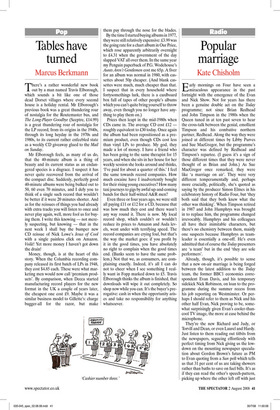Tables have turned
Marcus Berkmann
There’s a rather wonderful new book out by a man named Travis Elborough, which sounds a bit like one of those dead Dorset villages where every second house is a holiday rental. Mr Elborough’s previous book was a great thundering roar of nostalgia for the Routemaster bus, and The Long-Player Goodbye (Sceptre, £14.99) is a great thundering roar of nostalgia for the LP record, from its origins in the 1940s, through its long heyday in the 1970s and 1980s, to its current rather enfeebled state as a weekly CD giveaway glued to the Mail on Sunday.
Mr Elborough feels, as many of us do, that the 40-minute album is a thing of beauty and its current status as an endangered species is a disgrace. I suspect it has never quite recovered from the arrival of the compact disc. Suddenly, perfectly good 40-minute albums were being bulked out to 50, 60 even 70 minutes, and I defy you to think of a single such record that wouldn’t be better if it were 20 minutes shorter. And as for the reissues of things you had already with extra tracks you will listen to once and never play again, well, more fool us for buying them. I write this knowing — not merely suspecting, but knowing — that in the next week I shall buy the bumper new CD reissue of Nick Lowe’s Jesus of Cool with a single painless click on Amazon. Voilà! Yet more money I haven’t got down the drain!
Money, though, is at the heart of this story. When the Columbia recording company released its first batch of LPs in 1948, they cost $4.85 each. These were what marketing men would now call ‘premium products’. By comparison, when Decca started manufacturing record players for the new format in the UK a couple of years later, the cheapest one cost £9. Maybe it was a similar business model to Gillette’s: charge bugger-all for the razor, but make them pay through the nose for the blades.
By the time I started buying albums in 1977, they were still relatively expensive: £3.99 was the going rate for a chart album in Our Price, which rose apparently arbitrarily overnight to £4.31 when the government of the day slapped VAT all over them. In the same year my Penguin paperback of P.G. Wodehouse’s Aunts Aren’t Gentlemen cost me 65p. A fiver for an album was normal in 1980, with cassettes about 50p cheaper. (And blank cassettes were much, much cheaper than that. I suspect that in every household where fortysomethings lurk, there is a cardboard box full of tapes of other people’s albums which you can’t quite bring yourself to throw away, even though you no longer have anything to play them on.) Prices then leapt in the mid-1980s when CDs came in. The average CD cost £12 — roughly equivalent to £30 today. Once again the album had been repositioned as a premium product, even though CDs cost less than vinyl LPs to produce. My god, they made a lot of money. I have a friend who has been going to the same therapist for 15 years, and when she sits in her house for her weekly session she looks around and thinks, ‘I’ve paid for about a quarter of this.’ I feel the same towards record companies. How much cocaine have I inadvertently bought for their rising young executives? How many taxi journeys to gigs by awful up-and-coming bands for their half-witted A&R men?
Even three or four years ago, we were still all paying £11 or £12 for a CD, because that was how much they cost and there wasn’t any way round it. There is now. My local record shop, which couldn’t or wouldn’t reduce its prices to Amazon and Asda levels, went under with terrifying speed. The record companies are crying foul, but that’s the way the market goes: if you profit by it in the good times, you have absolutely no right to complain when the good times end. (Banks seem to have the same problem.) Not that we, as consumers, are complaining exactly. Indeed, it’s all I can do not to cheer when I see something I really want in Fopp marked down to £5. Travis Elborough thinks the album is finished, that downloads will wipe it out completely. So shop now while you can. It’s the buyer’s prerogative: cash in when the opportunity arises and take no responsibility for anything whatsoever.


























































 Previous page
Previous page